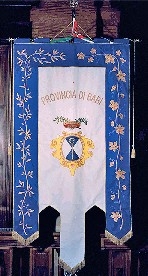
gonfalone
image from <www.provincia.ba.it>

Last modified: 2010-01-30 by dov gutterman
Keywords: italy | puglia | apulia | bari |
Links: FOTW homepage |
search |
disclaimer and copyright |
write us |
mirrors

gonfalone
image from <www.provincia.ba.it>
See also:
Municipalities:
The gonfanon (gonfalone) of Bari province (Apulia, Italy) is
at <www.provincia.ba.it>.
The gonfanon has a blue border adorned by gold leaves, olive on
the left and vine on the right. There are three slips, fringed
gold, the central and longest one of which is white of the field
and said field bears the provincial arms within a golden
cartouche. Above the shield is placed a (certain)
crown with sprigs of laurel and oak issuing from it; above crown
and shield is the legend “PROVINCIA DI BARI” in gold
letters. Slung away but still visible is the cravat in the
national colours, at the gonfanon’s top. Also at
each side there is a gold cord with tassel.
Blazons of both arms and gonfanon are found (in Italian) at <www.comuni-italiani.it>:
- Oval shield divided per saltire silver and azure, an upright
crozier or over all; a “lictor's crown” (corona
littoria) crossed by two branches of oak and laurel tied
with a tricolour ribbon.
- The banner is white with the provincial arms in the centre and
blue borders with gold embroidery of olive branches and shoots of
grapefruit (really?).
- Granted by royal decree on 27 August 1938.
Jan Mertens, 8 September 2009
The term "corona littoria" ("lictor's
crown") is only used on the descriptions of arms of the
province of Bari (Regio Decreto del 27 agosto 1938).
At least in the Internet neither "lictor's crown" nor
"corona littoria" are not found beyond the description
of the coat of arms of the province of Bari.
The other descriptions of coat of arms either don't mention the
crown, or they have a different crown (like the marchial crown on
the province of Avellino), or they use
some variations of the wording as in the official decree.
I have also seen the term "gem's crown" (corona
gemmata) to refer to this type of crown. E.g in the
description for the province of Udine at
<www.comuni-italiani.it>.
Dirk Schoenberger, 9 and 10 September 2009
ba.jpg)
image from <www.comuni-italiani.it>